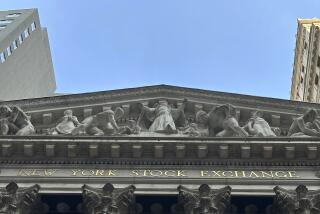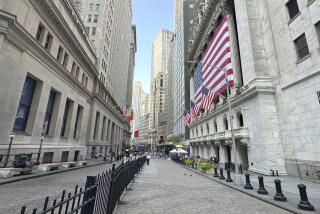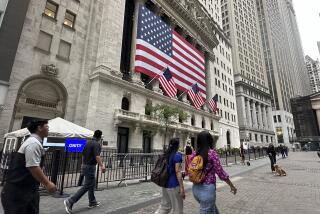Goldman Sachs reports second quarterly loss since going public
Goldman Sachs’ image as masters of the universe took a blow after the bank posted a quarterly loss for only the second time since going public.
The investment banking giant announced Tuesday that it lost $393 million, or 84 cents a share, in the three months ended Sept. 30. During the same quarter last year the firm had a profit of $1.9 billion, or $2.98 a share.
Goldman was expected to report a loss, but the numbers were worse than analysts had predicted.
Rather than being dragged down by any one division, the bank struggled across its business lines because of unpredictable markets and broader economic uncertainty — factors that are weighing on all Wall Street banks.
“The broader environment served as a significant head wind,” the firm’s chief financial officer, David Viniar, said in a conference call. “We are clearly disappointed about our results.”
The losses mark a stark reversal from Goldman’s record over the last few years. Although the bank, which went public in 1999, recorded one quarter of losses during the financial crisis, it quickly roared back to strong results thanks to support from the government and smart business moves.
Goldman’s recent success fueled anger toward the firm and led to a perception that it could find a way to profit under any circumstance. Now the firm’s vulnerability to the economic factors affecting Main Street is showing.
The struggles are being felt by the company’s employees. The number of workers fell by 1,300 in the third quarter, while the amount of money put aside for compensation dropped 59% from a year ago and 51% from the prior quarter.
Goldman’s loss contrasts with the profit that Bank of America and other big consumer banks have reported in recent days. Although those banks are being helped by the improving credit profile of ordinary consumers, the success of Goldman and other Wall Street firms is more directly tied to the stock and bond markets, which have fluctuated violently in recent months.
Third-quarter revenue in Goldman’s trading division, which has grown in importance in recent years, fell 13% from the same quarter last year. In its traditional business of advising mergers and acquisitions, revenue fell 33% from a year earlier.
The biggest loss came from investments Goldman made with its own money, including a stake in a leading Chinese bank that dropped in value by more than $1 billion during the quarter.
Goldman’s share price has fallen steadily in recent months and has dropped more than 42% this year.
Viniar said he has been disappointed that investors have not recognized the steps the bank has taken to ensure its continuing success.
“We kind of scratch our heads a little bit, but it hasn’t really affected anything other than our emotions,” Viniar said. “We don’t like seeing it.”
On Tuesday, Goldman shares rose 5.5%, or $5.35, to $102.25.
Analysts have suggested that government regulations would make it hard for Goldman and its peers to reach the profit levels experienced before the financial crisis. At the same time, few are expecting more losing quarters.
“Once business and investor confidence comes back, that franchise will start to roar back,” said Robert McMillan, an equity analyst at Standard & Poor’s.
More to Read
Inside the business of entertainment
The Wide Shot brings you news, analysis and insights on everything from streaming wars to production — and what it all means for the future.
You may occasionally receive promotional content from the Los Angeles Times.










